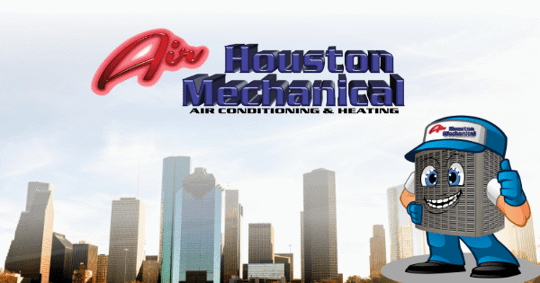We are indoors a lot. The EPA has determined the majority of people spend 90% of their time inside a building, where air quality can be 2–5 times more polluted than outside.
Decreased indoor air quality can have a negative influence on your health. That’s why it’s important to know the symptoms of inferior air quality in your house, what leads to it and how to repair it.
If you’re looking for ways to tell if your Huffman home’s air quality is bad, our team of home comfort experts at Air Houston Mechanical LLC can assist. We’ll go through the issues you’re having and provide suggestions to make your residence’s air better.
What Causes Indoor Air Pollution?
When you picture pollution, you typically think of smog. But ordinary products within your residence can produce pollution by the gases or particles they leak into the air.
These starting points include:
- Carbon monoxide
- Cleaning, personal care, and hobby products
- Combustion appliances, like a furnace or stove that uses gas
- Dust, animal dander, and pollen
- Excess moisture
- HVAC units
- Recently installed flooring or carpeting
- Secondhand smoke
- Artificial building materials, such as furniture manufactured from pressed wood
Indoor air pollution can be intensified by insufficient ventilation in your home, as well as hot temperatures and humidity. Modern residences are firmly sealed for energy efficiency, which is good for your energy expenses but not so great when you have to have more fresh air in your home.
Can Poor Indoor Air Quality Make You Sick?
Because people respond differently to indoor air pollutants, you could have symptoms now or later. Your symptoms can lessen when you leave your house but worsen when you return.
Some of the most usual immediate problems include:
- Dry eyes, nose, or throat
- Headaches
- Dizziness
- Fatigue
If someone in your family deals with allergies or asthma, their symptoms could be heightened.
Repeated or extended exposure could cause respiratory diseases, heart disease, or even cancer, the EPA warns.
Other Signs of Poor Indoor Air Quality and How to Improve It
Your residence will also indicate that its air isn’t as clean as it should be.
- Your house is very dusty, especially near the vents. It’s normal for your residence to get dusty during the week, but a lot of dust around your air registers should be cause for concern. There are other particles within the dust, like dust mites, pollen, and pet dander, that can influence your health, particularly if you deal with allergies or asthma. A premium air filter or whole-home air filtration system can help lower the concentration of dust and other irritating pollutants.
- Your residence has hot and cold rooms. Your HVAC equipment may be failing to maintain the correct temperature and humidity levels. Or there could be air distribution problems because of your HVAC equipment or ductwork. Our Air Houston Mechanical LLC pros can diagnose the trouble and suggest repairs or replacements.
- Your house’s air appears too dry or too wet. We recommend having your home’s humidity percentage around 30–40% for optimum comfort. If your residence isn’t humid enough during the winter, your skin and throat can feel dry. You might also have colds and other respiratory illnesses more regularly. If your residence is too humid during the summer, you may have higher mold and mildew growth, both of which are harmful to your well-being. You can take care of these issues with a whole-home humidifier or dehumidifier, which pairs your HVAC equipment to deliver balanced humidity around your house.
- Your house has odors that stick around. You may notice a stuffy smell when you come home. Or a cooking smell that just won’t go away. Since it’s not possible to have your windows open all the time, a whole-home ventilation system can get your house smell pleasant again. It replaces stale inside air with fresh outdoor air.
Other approaches the EPA advises taking include keeping your home smoke-free, getting carbon monoxide alarms, and tuning up your HVAC equipment. Regular furnace maintenance and AC maintenance help keep your equipment clean and efficient and could even help them work for a longer amount of time.
We Can Help Boost Your Residence’s Indoor Air Quality
If you suspect your house has an air quality problem, give our Air Houston Mechanical LLC HVAC experts a call at (832) 501-3419 or contact us online. We’re available to chat with you about options and offer a free estimate.
The post Signs Your Home Has Poor Indoor Air Quality and How to Repair It appeared first on Air Houston Mechanical LLC.

